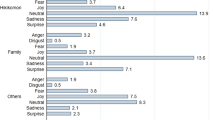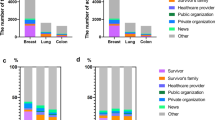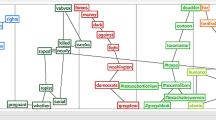Abstract
Purpose
This study aims to investigate use and misuse of the word ‘schizophrenia’ and its derivatives to assess the prevalence of stigmatizing and trivializing attitudes and the meanings attributed to the condition on Turkish Twitter.
Methods
Using R programming language, we collected Turkish Twitter posts containing the terms used for schizophrenia in Turkish through Twitter’s Search API over a 47-day period between July and June 2019. After removing retweets, we randomly sampled 3000 tweets and manually categorized them in three dimensions: use type (metaphorical/non-metaphorical), topic and attitude. Qualitative analysis on representative tweets were performed and word frequencies were calculated.
Results
In total 44,266 tweets were collected and after removing retweets, 24,529 tweets were obtained. Overwhelming majority of the tweets (91.7%) used the terms metaphorically and the majority displayed stigmatizing (68.3%) and trivializing (23%) attitudes. Politics was the most common topic (58.2%) followed by everyday/social chatter (28.5%). Only a small number of tweets were part of awareness campaigns (0.2%) or displayed a supportive attitude (0.8%). Terms were often used metaphorically in a stigmatizing manner as personal or political insults, while in everyday/social contexts, they were used in a trivializing manner to label eccentricity, oddness, overthinking and suspiciousness. Popularity and reach metrics show that these tweets were extensively retweeted, liked and reached millions of users.
Conclusion
This is the first study investigating attitudes towards schizophrenia on Turkish Twitter. Significantly higher rates of stigmatizing attitudes demonstrate the urgent need for public health and social awareness campaigns targeting stigma surrounding schizophrenia in Turkey.


Similar content being viewed by others
Data availability
Data is available upon request.
Code availability
Available on request
Notes
This attribution seems to be based on a press conference held by Mr. İnce the day after he lost the 2018 presidential election. He referred to the fake news and conspiracy theories on social media about him being kidnapped by the army as ‘fictions spread by a handful of schizophrenics’.
References
Sickel AE, Seacat JD, Nabors NA (2014) Mental health stigma update: a review of consequences. Adv Ment Heal 12:202–215. https://doi.org/10.1080/18374905.2014.11081898
Hayward P, Bright JA (1997) Stigma and mental illness: a review and critique. J Ment Heal 6:345–354
Corrigan PW, Druss BG, Perlick DA (2014) The impact of mental illness stigma on seeking and participating in mental health care. Psychol Sci Public Interes 15:37–70
Crisp AH, Gelder MG, Rix S et al (2000) Stigmatisation of people with mental illnesses. Br J Psychiatry 177:4–7. https://doi.org/10.1192/bjp.177.1.4
Angermeyer MC, Matschinger H, Schomerus G (2013) Attitudes towards psychiatric treatment and people with mental illness: changes over two decades. Br J Psychiatry 203:146–151. https://doi.org/10.1192/bjp.bp.112.122978
Robinson P, Turk D, Jilka S, Cella M (2019) Measuring attitudes towards mental health using social media: investigating stigma and trivialisation. Soc Psychiatry Psychiatr Epidemiol 54:51–58. https://doi.org/10.1007/s00127-018-1571-5
Guloksuz S, Van Os J (2019) Renaming schizophrenia: 5 × 5. Epidemiol Psychiatr Sci 28:254–257. https://doi.org/10.1017/S2045796018000586
Gaebel W, Kerst A (2019) The debate about renaming schizophrenia: a new name would not resolve the stigma. Epidemiol Psychiatr Sci 28:258–261. https://doi.org/10.1017/S2045796018000513
Goffman E (1963) Stigma: notes on the management of spoiled identity. Simon and Schuster, New York
Link BG, Phelan JC (2001) Conceptualizing stigma. Annu Rev Sociol 27:363–385. https://doi.org/10.1146/annurev.soc.27.1.363
Pavelko RL, Myrick JG (2019) Measuring trivialization of mental illness: developing a scale of perceptions that mental illness symptoms are beneficial. Health Commun 35:576–585
Pavelko R, Myrick JG (2016) Tweeting and trivializing. Imagin Cogn Pers 36:41–63. https://doi.org/10.1177/0276236615598957
Burnett D (2017) “A little bit OCD”: the downside of mental health awareness. In: Guard. https://www.theguardian.com/science/brain-flapping/2017/may/10/downside-increased-mental-health-awareness. Accessed 10 Aug 2020
Kelly J, Winterman D (2011) OCD, bipolar, schizophrenic and the misuse of mental health terms. In: BBC. https://www.bbc.com/news/magazine-15213824. Accessed 11 Aug 2020
Sontag S (2001) Illness as metaphor and AIDS and its metaphors. Picador, New York
Lakoff G, Johnson M (2008) Metaphors we live by. University of Chicago press, Chicago
Duckworth K, Halpern JH, Schutt RK, Gillespie C (2003) Use of schizophrenia as a metaphor in US newspapers. Psychiatr Serv 54:1402–1404
Magliano L, Read J, Marassi R (2011) Metaphoric and non-metaphoric use of the term “schizophrenia” in Italian newspapers. Soc Psychiatry Psychiatr Epidemiol 46:1019–1025
Clement S, Foster N (2008) Newspaper reporting on schizophrenia: a content analysis of five national newspapers at two time points. Schizophr Res 98:178–183
Lampropoulos D, Wolman A, Apostolidis T (2017) Analyzing the presentation and the stigma of schizophrenia in French newspapers. Soc Psychiatry Psychiatr Epidemiol 52:1541–1547
Hoffmann-Richter U, Forrer F, Finzen A (2003) Die Schizophrenie in der Frankfurter Allgemeinen Zeitung-ein Lehrstück. Psychiatr Prax 30:4–7
Boke O, Aker S, Aker AA et al (2007) Schizophrenia in Turkish newspapers. Soc Psychiatry Psychiatr Epidemiol 42:457–461
Sinnenberg L, Buttenheim AM, Padrez K et al (2017) Twitter as a tool for health research: a systematic review. Am J Public Health 107:e1–e8
Reavley NJ, Pilkington PD (2014) Use of Twitter to monitor attitudes toward depression and schizophrenia: an exploratory study. PeerJ 2:e647. https://doi.org/10.7717/peerj.647
Joseph AJ, Tandon N, Yang LH et al (2015) #Schizophrenia: use and misuse on twitter. Schizophr Res 165:111–115. https://doi.org/10.1016/j.schres.2015.04.009
Passerello GL, Hazelwood JE, Lawrie S (2019) Using Twitter to assess attitudes to schizophrenia and psychosis. BJPsych Bull 43:158–166
Hsieh H-F, Shannon SE (2005) Three approaches to qualitative content analysis. Qual Health Res 15:1277–1288
Hamad EO, Savundranayagam MY, Holmes JD et al (2016) Toward a mixed-methods research approach to content analysis in the digital age: the combined content-analysis model and its applications to health care Twitter feeds. J Med Internet Res 18:e60
Kearney MW (2019) rtweet: collecting and analyzing Twitter data. J Open Source Softw 4:1829
Silge J, Robinson D (2016) tidytext: text mining and analysis using tidy data principles in R. J Open Source Softw 1:37
Benoit K, Watanabe K, Wang H et al (2018) quanteda: an R package for the quantitative analysis of textual data. J Open Source Softw 3:774
O’sullivan PB, Flanagin AJ (2003) Reconceptualizing ‘flaming’and other problematic messages. New Media Soc 5:69–94
Guo S (2016) A meta-analysis of the predictors of cyberbullying perpetration and victimization. Psychol Sch 53:432–453
Angermeyer MC, Schulze B (2001) Reinforcing stereotypes: how the focus on forensic cases in news reporting may influence public attitudes towards the mentally ill. Int J Law Psychiatry 24:469–486
Chopra AK, Doody GA (2007) Schizophrenia, an illness and a metaphor: analysis of the use of the term ‘schizophrenia’in the UK national newspapers. J R Soc Med 100:423–426
Diener E (1979) Deindividuation: the absence of self-awareness and self-regulation in group members. J Pers Soc Psychol 37:1160–1171
Suler J (2004) The online disinhibition effect. Cyberpsychol Behav 7:321–326. https://doi.org/10.1089/1094931041291295
Tufekci Z (2014) Big questions for social media big data: Representativeness, validity and other methodological pitfalls. In: Eighth International AAAI Conference on Weblogs and Social Media
boyd D, Golder S, Lotan G (2010) Tweet, tweet, retweet: Conversational aspects of retweeting on twitter. In: 2010 43rd Hawaii international conference on system sciences. IEEE, pp 1–10
Senel Kara B, Kara UY (2020) P118: Investigating content types and attitudestowards autism spectrum disorder on Turkish Twitter: a descriptive study. In: 33rd Congress of ECNP
Betton V, Borschmann R, Docherty M et al (2015) The role of social media in reducing stigma and discrimination. Br J Psychiatry 206:443–444
Funding
No funding.
Author information
Authors and Affiliations
Contributions
UYK: designed the study, conducted data collection, performed manual content analysis, analyzed the data, prepared the figures, wrote the paper, reviewed drafts of the paper. BŞK: designed the study, performed manual content analysis, analyzed the data, prepared the figures, wrote the paper, reviewed drafts of the paper.
Corresponding author
Ethics declarations
Conflict of interest
We declare that we have no conflict of interest.
Supplementary Information
Below is the link to the electronic supplementary material.
Rights and permissions
About this article
Cite this article
Kara, U.Y., Şenel Kara, B. Schizophrenia on Turkish Twitter: an exploratory study investigating misuse, stigmatization and trivialization. Soc Psychiatry Psychiatr Epidemiol 57, 531–539 (2022). https://doi.org/10.1007/s00127-021-02112-x
Received:
Accepted:
Published:
Issue Date:
DOI: https://doi.org/10.1007/s00127-021-02112-x




